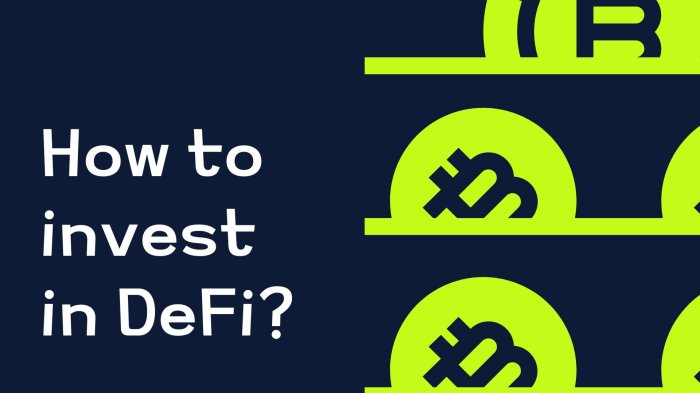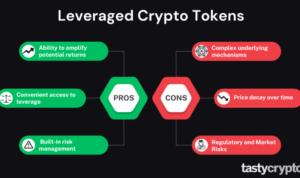Kicking off with What to Know Before Investing in DeFi, this article is all about getting you prepped and ready to dive into the world of decentralized finance. So, buckle up and let’s uncover the key insights together!
Overview of DeFi
Decentralized Finance, aka DeFi, is like the cool rebel cousin of traditional finance. Instead of relying on big banks or institutions to handle your money, DeFi cuts out the middleman and lets you manage your finances directly using blockchain technology.
Key Benefits of DeFi
- Complete Control: With DeFi, you have full control over your funds without needing to trust a third party.
- Transparency: All transactions are recorded on the blockchain, making them easily verifiable.
- Accessibility: DeFi opens up financial services to anyone with an internet connection, no need for a bank account.
Popular DeFi Platforms and Projects
- Uniswap: A decentralized exchange allowing users to trade various cryptocurrencies without a central authority.
- Compound: A lending platform that enables users to lend and borrow crypto assets in a decentralized manner.
- Aave: A decentralized lending protocol that offers users the ability to earn interest on their crypto holdings.
Risks Associated with DeFi

Investing in Decentralized Finance (DeFi) comes with its own set of risks that investors need to be aware of in order to protect their investments.
Security Challenges in DeFi Platforms
DeFi platforms are susceptible to security vulnerabilities and smart contract bugs, which can result in hacks and funds being stolen. It is crucial for users to conduct thorough research on the platforms they are investing in and to only interact with audited and reputable projects. Utilizing hardware wallets and keeping private keys secure can also help mitigate these risks.
Volatility in the DeFi Space
The DeFi space is known for its high volatility, with prices of tokens fluctuating significantly within short periods of time. Investors should be prepared for sudden price movements and potential losses. Diversifying investments across different projects can help reduce the impact of volatility on a single asset.
Regulatory Risks in DeFi
DeFi operates in a relatively unregulated environment, which can lead to uncertainty regarding legal frameworks and potential regulatory changes. Investors should stay informed about evolving regulations and be prepared for the impact they may have on their investments. Collaborating with legal experts can provide guidance on compliance and risk management in the DeFi space.
Understanding Smart Contracts

Smart contracts are self-executing contracts with the terms of the agreement between buyer and seller written into code. In the DeFi ecosystem, smart contracts play a crucial role in facilitating transactions without the need for intermediaries.
Functionality of Smart Contracts in DeFi
Smart contracts in DeFi automate the process of transactions, ensuring that they are executed only when specific conditions are met. This not only increases efficiency but also reduces the risk of fraud or manipulation.
- Smart contracts help in providing transparency and security by eliminating the need for third-party intermediaries.
- They enable the creation of decentralized applications (dApps) that can operate independently without centralized control.
- Smart contracts can be used for various DeFi applications such as decentralized exchanges (DEXs), lending platforms, and yield farming protocols.
Examples of DeFi Applications Using Smart Contracts
Some popular DeFi platforms that utilize smart contracts include:
- Uniswap: A decentralized exchange that allows users to swap various tokens directly through smart contracts.
- Compound Finance: A lending protocol that enables users to earn interest by supplying assets to the platform through smart contracts.
- Yearn Finance: A yield aggregator that automatically allocates funds to different DeFi protocols based on the best yield opportunities using smart contracts.
Researching DeFi Projects: What To Know Before Investing In DeFi

Before diving into the world of DeFi projects, it is crucial to conduct thorough research to make informed investment decisions.
Importance of Due Diligence, What to Know Before Investing in DeFi
Researching DeFi projects involves conducting due diligence to understand the project’s fundamentals and assess its potential for success.
- Review the team background to ensure they have the necessary expertise and experience in the field.
- Examine project whitepapers to understand the technology, goals, and roadmap of the DeFi project.
- Evaluate community support through forums, social media, and other platforms to gauge the project’s popularity and credibility.
Identifying Red Flags
It is essential to be vigilant and watch out for potential red flags that may indicate risks or fraudulent activities in DeFi projects.
-
Be wary of projects promising high returns with little to no risk, as they may be too good to be true.
- Check for inconsistencies or lack of transparency in the project’s documentation and communications.
- Look out for projects with anonymous teams or lack of verifiable information, as these may raise suspicions.
Managing Risk in DeFi Investments
Investing in DeFi can be rewarding, but it also comes with its fair share of risks. To navigate this volatile space successfully, it’s crucial to implement effective risk management strategies.
Diversification in DeFi
Diversification is a key strategy in managing risk in DeFi investments. By spreading your investments across different projects, you can reduce the impact of negative events on any single asset. This helps to safeguard your portfolio against potential losses and market volatility.
- Allocate your funds across various DeFi projects to minimize risk exposure.
- Consider investing in different types of assets, such as stablecoins, tokens, and lending platforms.
- Regularly review and rebalance your portfolio to maintain diversification.
Setting Stop-Loss Orders
Setting stop-loss orders is another crucial risk management tool in DeFi. By establishing predetermined price levels at which you are willing to sell your assets, you can limit potential losses and protect your investment capital.
- Use stop-loss orders to automatically sell your assets if prices reach a certain threshold.
- Adjust stop-loss levels based on market conditions and asset performance.
- Monitor your investments closely to ensure stop-loss orders are triggered effectively.
Monitoring Investments
Monitoring your investments in DeFi is essential for risk management. By staying informed about market trends, project developments, and security risks, you can make informed decisions and take timely actions to protect your funds.
- Regularly check the performance of your investments and adjust strategies accordingly.
- Stay updated on news and updates related to DeFi projects to identify potential risks.
- Utilize analytics tools and platforms to track the value and performance of your assets.





